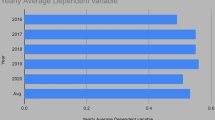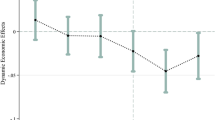Abstract
The purpose of this study is to examine the impact of green tax incentives such as investment tax credit and taxable income deductions related to the environmental sustainability and climate change which are becoming more popular in developing countries, whereas introducing green tax incentives related to the environment and climate change helps and meets the sustainability objectives of growth and development. For this purpose, we selected the top 100 listed companies on the Swedish stock market (SSM), Nasdaq Stockholm (SN), in order to better understand the real facts and figures of green tax environment. This study uses a longitudinal research design because sample observations vary across firms and over a short time and conducts probit and logistic regression to identify the beneficiaries of the tax incentives. The findings show that different firm-level characteristics significantly impact the probability of being an ITC beneficiary.

Similar content being viewed by others
Data availability
The data is available on request from the corresponding author.
Notes
Mullainathan, S., & Thaler, R. H. (2000). Behavioral economics.
References
Anser MK, Usman M, Sharif M, Bashir S, Shabbir MS, Yahya Khan G, Lopez LB (2021) The dynamic impact of renewable energy sources on environmental economic growth: evidence from selected Asian economies. Environ Sci Pollut Res 1–13
Arslan Z, Kausar S, Kannaiah D, Shabbir MS, Khan GY, Zamir A (2021) The mediating role of green creativity and the moderating role of green mindfulness in the relationship among clean environment, clean production, and sustainable growth. Environ Sci Pollut Res 1–15
Bai D, Jain V, Tripathi M, Ali SA, Shabbir MS, Mohamed MA, Ramos-Meza CS (2022) Performance of biogas plant analysis and policy implications: evidence from the commercial sources. Energy Policy 169:113173
Cao X, Kannaiah D, Ye L, Khan J, Shabbir MS, Bilal K, Tabash MI (2022a) Does sustainable environmental agenda matter in the era of globalization? The relationship among financial development, energy consumption, and sustainable environmental-economic growth. Environ Sci Pollut Res 1–11
Cao Y, Tabasam AH, Ali SA, Ashiq A, Ramos-Meza CS, Jain V, Shabbir MS (2022b) The dynamic role of sustainable development goals to eradicate the multidimensional poverty: evidence from emerging economy. Economic Research-Ekonomska Istraživanja 1–12
Chen J, Su F, Jain V, Salman A, Tabash MI, Haddad AM, ... Shabbir MS (2022) Does renewable energy matter to achieve sustainable development goals? The impact of renewable energy strategies on sustainable economic growth. Front Energy Res 10: 829252
Chok NS (2010) Pearson’s versus Spearman’s and Kendall’s correlation coefficients for continuous data (Doctoral dissertation, University of Pittsburgh)
Dahlberg L, Wiklund F (2018) ESG investing in Nordic countries: an analysis of the shareholder view of creating value
Dai Z, Sadiq M, Kannaiah D, Khan N, Shabbir MS, Bilal K, Tabash MI (2022) Correction to: The dynamic impacts of financial investment on environmental-health and MDR-TB diseases and their influence on environmental sustainability at Chinese hospitals. Environ Sci Pollut Res 1–1
Erhart S (2018) Exchange-traded green bonds. J Environ Invest 1–41
Ge M, Kannaiah D, Li J, Khan N, Shabbir MS, Bilal K, Tabash MI (2022) Does foreign private investment affect the clean industrial environment? Nexus among foreign private investment, CO2 emissions, energy consumption, trade openness, and sustainable economic growth. Environ Sci Pollut Res 1–8
Goolsbee A (1998) Investment tax incentives, prices, and the supply of capital goods. Q J Econ 113(1):121–148
Hall RE, Jorgenson DW (1967) Tax policy and investment behavior. Am Econ Rev 57(3):391–414
Hox JJ, Boeije HR (2005) Data collection, primary versus secondary
Jagers SC, Hammar H (2009) Environmental taxation for good and for bad: the efficiency and legitimacy of Sweden’s carbon tax. Environ Politics 18(2):218–237
Jain V, Ramos-Meza CS, Aslam E, Chawla C, Nawab T, Shabbir MS, Bansol A (2022) Do energy resources matter for growth level? The dynamic effects of different strategies of renewable energy, carbon emissions on sustainable economic growth. Clean Technol Environ Policy 1–7
Jun W, Mughal N, Zhao J, Shabbir MS, Niedbała G, Jain V, Anwar A (2021) Does globalization matter for environmental degradation? Nexus among energy consumption, economic growth, and carbon dioxide emission. Energy Policy 153:112230
Khan MB, Saleem H, Shabbir MS, Huobao X (2021) The effects of globalization, energy consumption and economic growth on carbon dioxide emissions in South Asian countries. Energy Environ 0958305X20986896
Khurshid A, Rauf A, Calin AC, Qayyum S, Mian AH, Fatima T (2022) Technological innovations for environmental protection: role of intellectual property rights in the carbon mitigation efforts. Evidence from western and southern Europe. Int J Environ Sci Technol 19(5):3919–3934
Li H, Jiang Y, Ashiq A, Salman A, Haseeb M, Shabbir MS (2022) The role of technological innovation, strategy, firms performance, and firms size and their aggregate impact on organizational structure. Manage Decis Econ
Liu C, Ni C, Sharma P, Jain V, Chawla C, Shabbir MS, Tabash MI (2022a) Does green environmental innovation really matter for carbon-free economy? Nexus among green technological innovation, green international trade, and green power generation. Environ Sci Pollut Res 1–9
Liu J, Jain V, Sharma P, Ali SA, Shabbir MS, Ramos-Meza CS (2022b) The role of sustainable development goals to eradicate the multidimensional energy poverty and improve social wellbeing’s. Energ Strat Rev 42:100885
Liu Y, Sharma P, Jain V, Shukla A, Shabbir MS, Tabash MI, Chawla C (2022c) The relationship among oil prices volatility, inflation rate, and sustainable economic growth: evidence from top oil importer and exporter countries. Resour Policy 77:102674
Liu Y, Cao D, Cao X, Jain V, Chawla C, Shabbir MS, Ramos-Meza CS (2022d) The effects of MDR-TB treatment regimens through socioeconomic and spatial characteristics on environmental-health outcomes: evidence from Chinese hospitals. Energy Environ. https://doi.org/10.1177/0958305X221079425
Liu G, Yang Z, Zhang F, Zhang N (2022e) Environmental tax reform and environmental investment: a quasi-natural experiment based on China’s environmental protection tax law. Energy Econ 109:106000
Liu L, Bashir T, Abdalla AA, Salman A, Ramos-meza CS, Jain V, Shabbir MS (2022f) Can money supply endogeneity influence bank stock returns? A case study of South Asian economies. Environ Dev Sustain 1–13
Mao J, Wang C (2016) Tax incentives and environmental protection: evidence from China’s taxpayer-level data. China Financ Econ Rev 4(1):1–30
Mughal N, Arif A, Jain V, Chupradit S, Shabbir MS, Ramos-Meza CS, Zhanbayev R (2022) The role of technological innovation in environmental pollution, energy consumption and sustainable economic growth: evidence from South Asian economies. Energ Strat Rev 39:100745
Muhammad I, Shabbir MS, Saleem S, Bilal K, Ulucak R (2021) Nexus between willingness to pay for renewable energy sources: evidence from Turkey. Environ Sci Pollut Res 28(3):2972–2986
Muhammad I, Ozcan R, Jain V, Sharma P, Shabbir MS (2022) Does environmental sustainability affect the renewable energy consumption? Nexus among trade openness, CO2 emissions, income inequality, renewable energy, and economic growth in OECD countries. Environ Sci Pollut Res 1–11
Nawab T, Raza S, Shabbir MS, Yahya Khan G, Bashir S (2022) Multidimensional poverty index across districts in Punjab, Pakistan: estimation and rationale to consolidate with SDGs. Environ Dev Sustain 1–25
Sadiq M, Kannaiah D, Yahya Khan G, Shabbir MS, Bilal K, Zamir A (2022) Does sustainable environmental agenda matter? The role of globalization toward energy consumption, economic growth, and carbon dioxide emissions in South Asian countries. Environ Dev Sustain 1–20
Saleem H, Khan MB, Shabbir MS, Khan GY, Usman M (2022) Nexus between non-renewable energy production, CO2 emissions, and healthcare spending in OECD economies. Environ Sci Pollut Res 1–12
Shabbir MS, Wisdom O (2020) The relationship between corporate social responsibility, environmental investments and financial performance: evidence from manufacturing companies. Environ Sci Pollut Res 1–12. https://doi.org/10.1007/s11356-020-10217-0
Shabbir MS, Aslam E, Irshad A, Bilal K, Aziz S, Abbasi BA, Zia S (2020) Nexus between corporate social responsibility and financial and non-financial sectors’ performance: a non-linear and disaggregated approach. Environ Sci Pollut Res 27(31):39164–39179
Shabbir MS, Bashir M, Abbasi HM, Yahya G, Abbasi BA (2021) Effect of domestic and foreign private investment on economic growth of Pakistan. TCR 13(4):437–449
Tresch RW (2022) Public finance: a normative theory. Academic Press
Wang J, Tang D, Boamah V (2022a) Environmental governance, green tax and happiness—an empirical study based on CSS (2019) data. Sustainability 14(14):8947
Wang G, Sadiq M, Bashir T, Jain V, Ali SA, Shabbir MS (2022b) The dynamic association between different strategies of renewable energy sources and sustainable economic growth under SDGs. Energ Strat Rev 42:100886
Yaqoob N, Ali SA, Kannaiah D, Khan N, Shabbir MS, Bilal K, Tabash MI (2022a) The effects of agriculture productivity, land intensification, on sustainable economic growth: a panel analysis from Bangladesh, India, and Pakistan economies. Environ Sci Pollut Res 1–9
Yaqoob N, Jain V, Atiq Z, Sharma P, Ramos-Meza CS, Shabbir MS, Tabash MI (2022b) The relationship between staple food crops consumption and its impact on total factor productivity: does green economy matter?. Environ Sci Pollut Res 1–10
Yikun Z, Gul A, Saleem S, Shabbir MS, Bilal K, Abbasi HM (2021) The relationship between renewable energy sources and sustainable economic growth: evidence from SAARC countries. Environ Sci Pollut Res 1–10
Yang X, Ramos-Meza CS, Shabbir MS, Ali SA, Jain V (2022) The impact of renewable energy consumption, trade openness, CO2 emissions, income inequality, on economic growth. Energ Strat Rev 44:101003
Yu S, Sial MS, Shabbir MS, Moiz M, Wan P, Cherian J (2021) Does higher population matter for labour market? Evidence from rapid migration in Canada. Economic Research-Ekonomska Istraživanja 34(1):2337–2353
Author information
Authors and Affiliations
Contributions
Mariuam Shafi: conceptualization and investigation; Carlos Meza: data creation and resources; Vipin Jain: methodology. Asma Salman: methodology and formal analysis; Mustafa Kamal: data analysis; Malik Shahzad: result and discussion section. Masood ur Rahman: abstract and conclusion sections and formation of paper as per journal requirements.
Corresponding author
Ethics declarations
Ethical approval and consent to participate
This study did not use any kind of human participants or human data, which require any kind of approval.
Consent for publication
Our study did not use any kind of individual data such as video and images.
Competing interests
The authors declare no conflict of interest.
Additional information
Responsible Editor: Nicholas Apergis
Publisher's note
Springer Nature remains neutral with regard to jurisdictional claims in published maps and institutional affiliations.
Rights and permissions
Springer Nature or its licensor (e.g. a society or other partner) holds exclusive rights to this article under a publishing agreement with the author(s) or other rightsholder(s); author self-archiving of the accepted manuscript version of this article is solely governed by the terms of such publishing agreement and applicable law.
About this article
Cite this article
Shafi, M., Ramos-Meza, C.S., Jain, V. et al. The dynamic relationship between green tax incentives and environmental protection. Environ Sci Pollut Res 30, 32184–32192 (2023). https://doi.org/10.1007/s11356-023-25482-y
Received:
Accepted:
Published:
Issue Date:
DOI: https://doi.org/10.1007/s11356-023-25482-y




